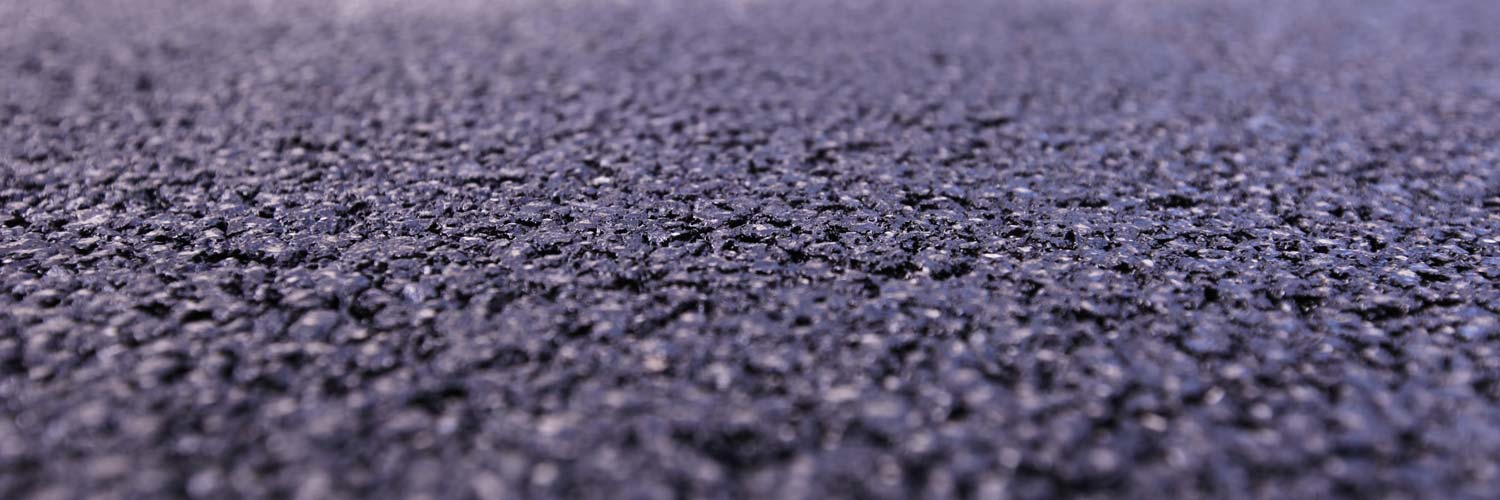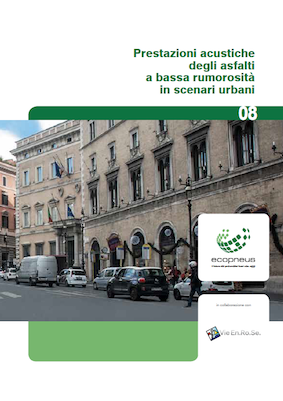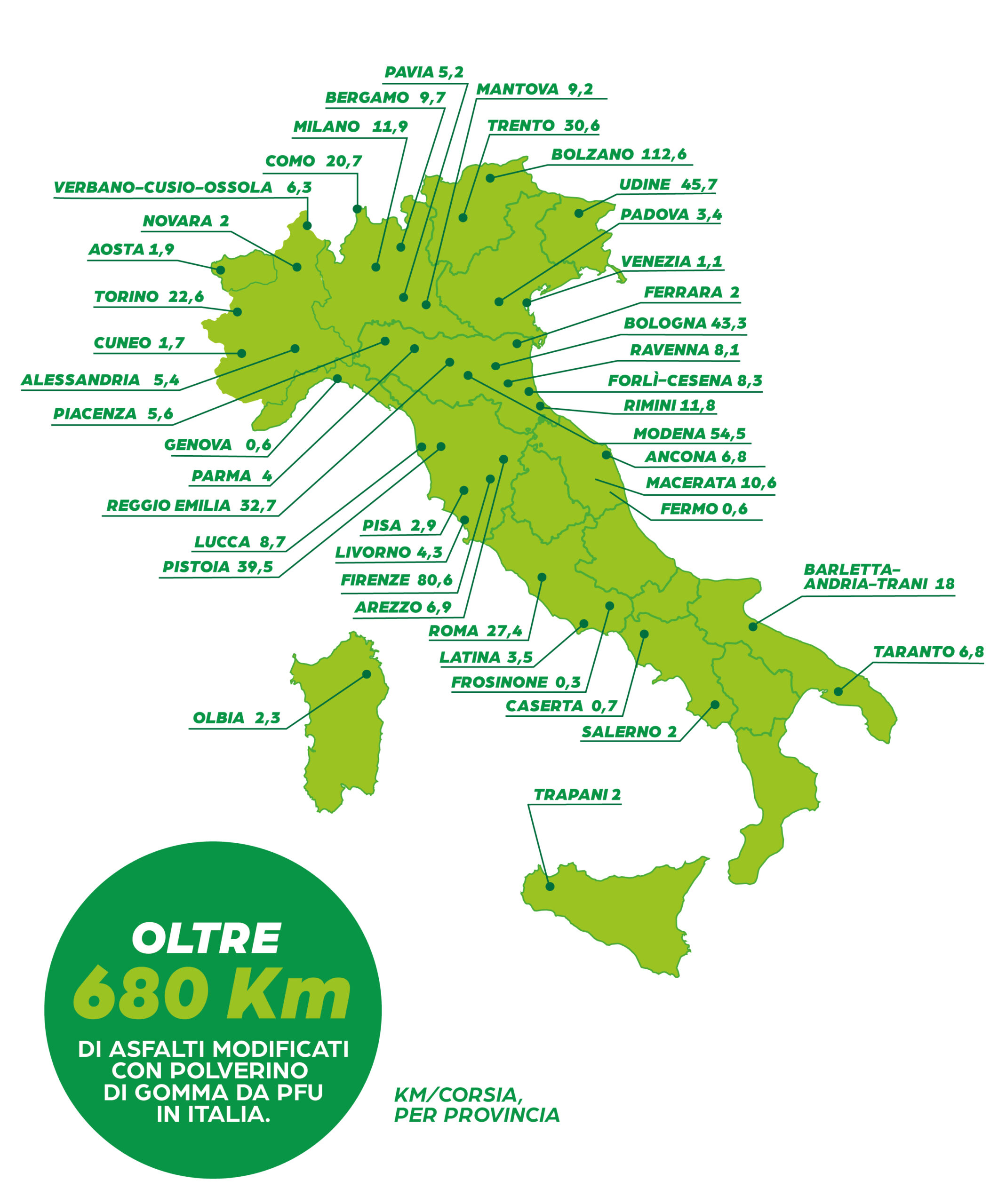
The modified asphalts in Italy
Driving on a road without potholes, safer and more silent is every driver’s dream. A dream which is already reality in many Provinces all over Italy where parts of roads have been surfaced with modified asphalts, with the addition of rubber from End-of-Life tyres.
By adding rubber powder to asphalt bitumen, it is possible to obtain road pavements with better mechanical performances compared to conventional bitumen, and, moreover, they can reduce the noise caused by the passage of vehicles. In Italy the use of this technology has consolidated in time. This is also thanks to the constant commitment of Ecopneus. On the one hand with its support to new interventions and monitoring campaigns, on the other hand it has raised awareness, spread technical information and scientific data on this important application of recycled rubber.
So far, more than 670 km/lane of roads with modified asphalt containing ELT recycled rubber have been made in Italy. Emilia Romagna, Tuscany, Piedmont and Trentino Alto Adige are the regions with the most important experiences.
The advantages of modified asphalts with recycled rubber powder are:
- Reduction of the noise generated by the tyre in contact with the road and, in certain types of asphalt, also by vehicles more in general;
- high durability of the pavement and exceptional resistance to aging, with international experiences of lifetimes up to three times longer than those of traditional asphalt;
- greater resistance of the surface to cracks. This leads to the consequent containment of maintenance interventions, with the reduction of the inconvenience caused by maintenance works and their related costs;
- greater safety, thanks to the excellent grip, water drainage with subsequent noticeable reduction of the splash and spray effect in case of rain and improvement in visibility. The modified asphalt greater resistance to potholes that consequently leads to a reduction of road works increases the citizens’ comfort and reduces accidents and noise.

In collaboration with Universities and research centres, Ecopneus has promoted a series of technical dossiers on modified asphalts in the course of the years. They scientifically deal with technical aspects, case histories, experiences and characteristics of the different types of modified asphalts.
The dossiers are distributed in all the events of reference; they are shipped to some selected contacts, and they can be freely downloaded from our website. Download all the dossiers! (documents in italian)
08. Prestazioni acustiche degli asfalti modificati in scenari urbani
13. Guida per la produzione di bitumi con polverino di gomma da PFU
16. La Variante Canali di Reggio Emilia: una strada green
17: Strati di usura con polverino da PFU per la viabilità urbana
Noise reduction
One of the main advantages of modified asphalts is, thus, noise reduction. By appropriately planning the bitumen mixes, it is possible to obtain an asphalt that can reduce the noise generated by the passage of transiting vehicles up to 7dB. This value corresponds to halving the sound energy perceived by human ears. It is a very important aspect, considering that 1/5 of EU’s population is exposed to excessive noise levels and, according to the World Health Organisation, noise pollution causes over 10,000 premature deaths in Europe every year.
Moreover, Italy is currently undergoing an infringement procedure for not doing enough to prevent and contrast excessive noise levels. This is another reason for further spreading this valid technology, especially in urban environments.
A useful longer life
The longer duration of modified asphalts has been confirmed by the tests carried out on the “Variante Canali” in the city of Reggio Emilia. This important road was paved with bitumen modified with rubber powder. It was one of the first in Italy. After 6 years the pavement was still perfect, despite its thickness was almost halved compared to the initial project. It showed no need of maintenance. Indeed, thanks to its greater performance thanks to the addition of rubber, it was possible to reduce the overall asphalt thickness from 25 to 15 cm. This allowed great savings of materials, energy and resources. The analyses carried out to verify its state of service have predicted 18 more years of useful life without meaningful interventions.
Moreover, thanks to the use of secondary raw materials, from rubber powder to asphalt millings, it was possible to avoid the emission of 40 tonnes of CO2 and reduce energy consumption of 70,000 kWh, even if it is only a distance of 3 km. This saving is equivalent to the average monthly consumption of 300 families of Reggio Emilia.
The project LIFE NEREIDE
The project LIFE NEREIDE aims at creating extremely long-lasting, performing and “silent” asphalts using recycled materials such as rubber powder from ELTs and asphalt millings. This project is led by the Department of Civil and Industrial Engineering of the University of Pisa in collaboration with Ecopneus, the Belgian research centre BRRC, the Institute of Acoustics and Sensoristics “Orso Mario Corbino”, Region Tuscany and Arpat – the Regional Body for the Environmental Protection of Tuscany.
During the project, at least 4,000 m of new experimental pavements with 12 different bitumen conglomerate mixes for layers of use at low sound emissions will be created.
Overall, over 24,000 kg of recycled rubber and 30-50% of recycled asphalt will be used. The floorings will be produced and put into place with the “warm” technology, i.e.: with temperatures lower than 30-40° C compared to the traditional asphalts modified with ELT recycled rubber, thus also lowering the emission of vapours of Polycyclic Aromatic Hydrocarbons (PAHs) by 30%.
A reduction of the urban noise pollution of at least 5dB is expected, as well as a 20% increase of the friction. This will improve road safety too


 Collect ELT
Collect ELT